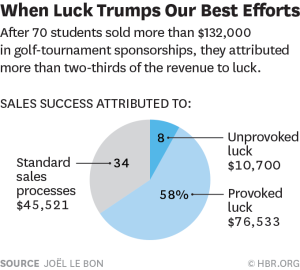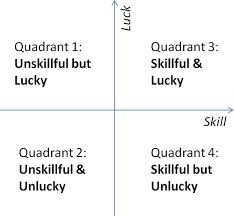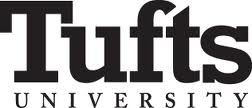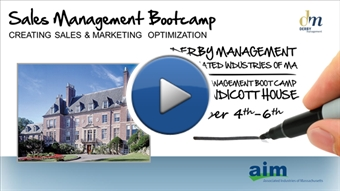Most mornings when I'm getting ready for the day at the gym after working out, I find myself shaving in the sink area near Dr. Steve, a world-renowned surgeon. Over the years, I've gotten to know him very well, and recently he's been a wonderful sounding board for me as I maneuvered my way through the maze of hospital procedures, protocols and processes.
By now, I've learned that his weekly schedules start with full days of surgery on Mondays and Tuesdays. This week, on Tuesday morning, I asked how the prior day's surgeries went, and his response to a particularly difficult case on Monday was "it's better to be lucky than good".
An interesting phrase I thought! I talked to him about what he meant, and then spent time thinking about what would be the proper mix between expertise and skills on one side balanced with luck on the other? Is it 95% skills and 5% luck? 1% or 10% luck? Can't be 50% since one's actual skills performance would be abysmal. And what is luck anyhow?
Which got me to thinking about the impact of luck in the profession of sales and whether there was any data of any kind to substantiate a direction one way or the other. In fact, in our sales vocabulary, we frequently use THE LUCK WORD all the time.
- We always wish one another luck in our various sales activities
- We typically say "good luck" to one another at the start of a sales day
- When asking about the quarter, we end that talk with "good luck"
With these thoughts kicking around in my head, I then happened to find an interesting HBR article published just this week under the heading, "Why the Best Salespeople Get So Lucky".
You should take the time to read the article yourself, plus I would love to get your feedback of your own sales experience and your current sales processes that relate to luck ... or the lack of it. If you can take a couple of minutes, just comment below directly on this blog post.
The author of the article, Joël Le Bon points out that he believes that luck can be managed. His research shows that luck should be viewed as a controllable determinant of salespeople’s achievement. He goes on to explain that success derives not from effort alone but from a combination of effort and luck.

As a professor, during a recent semester, he ran an experiment in which 70 students sold more than $132,000 in golf-tournament sponsorships.
At the end of that process, they attributed more than two-thirds of their revenue to luck. About 60% came from what Le Bon calls “luck circumstances,” with the rest derived from standard sales processes.
In his studies, he found that...
- the greater a salesperson’s belief that success is a combination of luck and effort, and that good luck will come along sooner or later, the greater the number of sales activities, such as making phone calls, meeting prospects, qualifying prospects, and gathering intelligence about prospects and competitors.
- The greater the number of these sales activities, the greater the opportunities for luck, and the greater the person’s "provoked" luck, meaning luck that the salesperson created or provoked to happen.
- The greater the amount of provoked luck, the higher the performance of closing deals.
 An interesting step-by-step thought process, but I'm not sure that there is anything really to "this luck theory" in Sales. I've just seen too many salespeople fired as a direct result of either their hoping (called in the sales trade-"the strategy of hope") or that luck would swoop in at the end and save the day...and maybe their job.
An interesting step-by-step thought process, but I'm not sure that there is anything really to "this luck theory" in Sales. I've just seen too many salespeople fired as a direct result of either their hoping (called in the sales trade-"the strategy of hope") or that luck would swoop in at the end and save the day...and maybe their job.
My experience is that luck (the results of which are called "Bluebirds" in the trade) rarely happens... other than by luck.
Motivation
Let's forget the "luck" word, which is way too touchy-feely for me anyhow, and substitute the word "motivation". What I do know is that the specifics of the science of motivation can be taught and trained for. If then, I combine what it takes to motivate a salesperson...
- performance measurements compared to one's peers
- belief in one's manager as Coach and Leader
- motivational speeches from relevant speakers
- compensation incentives
If then I combine these four expressions of motivation with specific planned out activities, the result will be a winning equation, which is both scalable and predictable...
(Motivation + Activities) = More Opportunities x Effort = More Sales
What we've discovered over the years, and this comes down to "The Basics of Sales", is that the simplicity of creating more Activities...
- prospect and customer F2F visits
- more cold calling. (It still works by the way)
- increased F2F account reviews directly with the customer
- increased number of Discovery calls
- increased calls to partners and channels asking for leads
...is the Number #1 determinant of creating more Opportunities, and more Opportunities ultimately create more sales in a shorter period of time. Simply a math equation.
Combine these activities with a consistent and repeatable process of motivating the salesforce, and then sprinkle in formal sales processes and tools. It's our experience that not only will sales increase in the vast majority of situations, but that the individual salespeople will mature more quickly and scale their own personal performance as a direct result.
Interesting idea, this luck thing. I would like to hear your own comments of what you think of the role that luck plays in your on sales process. Just jot down your comments in this post. In the meantime...
Good Selling!

Head Coach
Derby Management...for 25 years
-Sales & Marketing Productivity Experts
-Business & Strategy Planning Specialists
Box 171322, Boston, MA 02117
617-292-7101
Jack's Cell: 617-504-4222
Want to know more about Derby Management, click HERE
Plan now on attending our 2015 Sales Management Boot Camp held at the MIT Endicott House on October 4th-6th. Over 7 years of continuing success involving 450 plus heads of sales, President and CEOs. Discounts available registering before June 30th.
 I'm starting to get prepared for my fall marketing course at Tufts, where I'm a professor in the entrepreneurs studies department.
I'm starting to get prepared for my fall marketing course at Tufts, where I'm a professor in the entrepreneurs studies department.
Each semester I look for six complex marketing assignments that are given to five person teams of juniors and seniors as semester-long projects. All of the course material is then taught around these projects
A syllabus along with the project outlines are sent to the students in early July with the requirement that they do research on the companies during the summer and define in writing before they come to the first class, why they should be accepted into the class. This is a very oversold class, and this is one of the ways through which I measure motivation and hard work. Right now, we have 46 students between registered, the wait list and the wait-wait list, and I need to bring that down to 32 by September. It always works
If you're interested in applying to be part of this very rewarding project, just let me know by email, and I will send you the instructions and what is expected of both the companies and the students. At the end of the semester, the company management teams will come to Tufts for 60 minute presentations along with delivering all of the project material, research data and recommendations that have been prepared.
It's a wonderful and rewarding experience!

